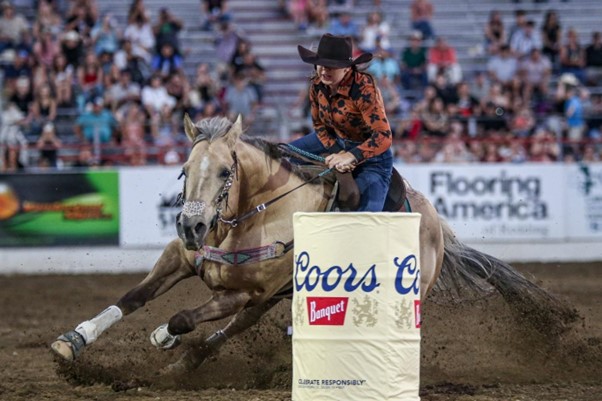Is your horse tiring out faster than usual? This could be an early sign of a low body condition score (BCS), a key indicator of your horse’s fat coverage, energy levels, and overall health. Fatigue, lethargy, and poor performance often trace back to an imbalanced BCS, making it a vital factor in equine care.
A fit, energetic horse is the result of mindful care, balanced nutrition, and smart training. As more horse owners across the U.S. aim to help their equine companions thrive, a horse’s body condition score is gaining the attention it deserves.
Whether your horse is a high-performance athlete, a weekend trail rider, or a beloved senior, understanding BCS is one of the most effective ways to build stamina, support recovery, and enhance overall well-being. Read on to learn why it matters and how to improve it.
The Importance of Horse Conditioning: What is a Healthy BCS?
Conditioning a horse means preparing their body and metabolic systems for the demands of work, competition, or recreation.
One of the cornerstones of equine health is achieving and maintaining the right horse body condition score. This numerical score, ranging from 1 (emaciated) to 9 (obese), helps owners and veterinarians objectively assess fat coverage and overall well-being.
A score of about 5 on the 1-9 scale (or 2.5-3 on a 0-5 scale) is considered ideal for most horses. It balances performance with health and reduces the risk of metabolic disease.
Creating a Conditioning Plan: Steps for All Levels of Horses
Regardless of your horse’s training or experience, a successful horse conditioning plan begins with clear, realistic goals and an honest assessment of your horse’s current fitness. Follow these steps to set up a plan.
1. Evaluate the Horse Body Condition Score
Start by regularly assessing and recording your horse's body condition score. An underweight horse may lack the energy to work or recover. On the other hand, an overweight horse is at greater risk for heat stress and soft tissue injury. Adjust feed and workload accordingly.
2. Determine Activity Level and Set Goals
Is your horse starting from pasture rest, light work, or already in training? Your plan will differ greatly based on activity level. Set practical milestones based on what you need. This can be improved stamina for trail riding or weight gain for overall health.
3. Develop a Gradual, Progressive Schedule
Increase exercise intensity and duration slowly, typically over 8–12 weeks. Incorporate rest days. A sample week might include:
- Day 1: Lunging/Walking/trotting under saddle
- Day 2: Hill work for strength
- Day 3: Flatwork, lunging or light riding
- Day 4: Rest
- Day 5: Cavaletti or pole work
- Day 6: Trail ride
- Day 7: Rest/light movement
4. Consistent Re-Evaluation
Monitor for changes in attitude, appetite, coat, and energy. Adjust your plan as needed to suit your horse’s evolving needs.
How To Promote Safe Recovery For Your Horse?
A compassionate conditioning plan recognizes limits as well. Overlooking early fatigue signs can lead to soreness, injury, and ongoing reluctance to train. Here’s how you can recognize signs of tiredness in your horse:
Signs of Fatigue
- Shortening stride or uneven rhythm
- Refusing usual cues
- Excessive sweating, rapid breathing
- Pulse that remains elevated well after work
- “Tying up” symptoms, such as muscle stiffness or refusal to move
- Sudden lack of enthusiasm for previously enjoyed activities
Remember, achieving an ideal horse body condition score doesn't mean pushing a horse beyond its capacity.
Safe Recovery Protocols
- Cool the horse down gradually with walking after exercise.
- Offer fresh water and allow time for heart and respiratory rates to return to normal.
- Provide turnout in a safe, grassy paddock to foster gentle muscle movement.
- Pay attention to feeding routines. After hard work, digestion may be slower; allow a little time before feeding concentrates.
If digestive health is also a concern, consider integrating a digestive support supplement for optimal gut and immune health.
Supplements for Muscle Recovery and Joint Support
There are many supplements for horse recovery that can help improve your horse’s body conditioning score. Here’s what the experts at Med-Vet Pharmaceuticals have found to deliver the best results:
Muscle Recovery Support
- Vitamin E & Selenium: Powerful antioxidants that help repair muscle cells after exertion.
- Magnesium: An essential mineral that plays a crucial role in muscle function.
- Amino Acids: Amino acids must be paired with a proper exercise/training regimen to help support the horse’s body synthesize new protein. And for performance horses, higher levels of amino acids are needed to help support normal muscle recovery and maintain optimal muscle mass. Lysine, methionine, and threonine are especially important.
- Electrolytes: Sodium, potassium, and chloride replace minerals lost through sweating and help muscles contract and recover efficiently.
Joint and Connective Tissue Support
- Glucosamine & Chondroitin: Maintain healthy cartilage and lubricate joints.
- Hyaluronic Acid: Helps cushion joints.
- Omega-3 Fatty Acids: Reduce inflammation and reinforce joint function.
Also Read: Respiratory Health Concerns in Performance Horses
Boosting Stamina: Nutritional Aids and Natural Enhancers
Enhancing horse stamina goes hand-in-hand with excellent nutrition and rest. Here’s how to promote lasting vitality for your horse:
Quality Forage
Never underestimate the power of good hay or pasture. The majority of your horse’s calories and nutrients should come from high-quality forage.
Balanced Concentrate Feed
Horses in active training may require a carefully balanced grain or pellet feed, but avoid overfeeding simple carbohydrates. Emphasize feeds with beet pulp, rice bran, or flaxseed.
Strategic Supplements
- B Vitamins: Boost energy production.
- Coenzyme Q10: Supports cellular energy.
- Adaptogens (e.g., ashwagandha): Used in some natural formulas to enhance endurance.
Regular Rest
No supplement can make up for chronic lack of rest. Always schedule downtime, especially after difficult rides or competitions.
Final Thoughts
Every horse truly has its own personality. As you build your bond, taking the time to regularly check your horse’s body condition score becomes a wonderful opportunity to understand what they’re trying to communicate. This way, each meal you prepare and every training session you enjoy together can be perfectly suited to their needs.
Along the way, it’s important to keep in mind that building strength takes time, patience, and gentle encouragement. Good nutrition, thoughtful care, and choosing the right supplements for recovery are all ways we can support our horses.
At MedVetPharm, we provide dependable supplements that help your horse stay active and comfortable through every age and activity level. Each formula contains carefully selected ingredients known to support body weight and stamina. With a legacy spanning over 40 years, we can work with you to supply high-quality equine muscle support and recovery supplements in Eden Prairie, MN and surrounding areas.
Feel free to explore our complete supplement lineup. If you're unsure which one suits your horse best, give us a call at 833-809-4848. We’re happy to help.
FAQs
Q1. What is horse conditioning and why is it important?
Ans. Horse conditioning is the structured development of a horse's fitness and health for specific tasks. It is important to build strength and prevent injury for overall well-being.
Q2. How do I start a conditioning plan for my horse?
Ans. A veterinary doctor can assess your horse’s body condition score and build a plan that gradually increases intensity.
Q3. What are the signs my horse is too fatigued during conditioning?
Ans. Short strides, unwillingness to move, excessive sweating, and abnormal heart rate recovery are red flags. Always listen to your horse’s demeanor and physical cues.
Q4. Which supplements are best for muscle recovery in horses?
Ans. Vitamin E, selenium, amino acids, and antioxidants support muscle repair. For joint health, look for glucosamine, chondroitin, and omega-3s.
Q5. How can I naturally boost my horse’s stamina?
Ans. Provide consistent exercise, high-quality forage, balanced concentrate, and adequate rest. Strategic use of B vitamins and adaptogenic herbs may also help.


